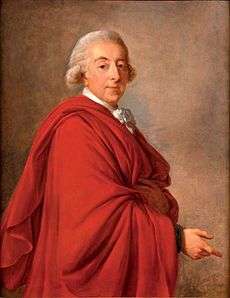Adam Kazimierz Czartoryski
| Prince Adam Kazimierz Czartoryski | |
|---|---|
 Portrait by Louise Élisabeth Vigée Le Brun Portrait by Louise Élisabeth Vigée Le Brun | |
| Spouse(s) | Izabella Czartoryska née Fleming |
|
Issue
Teresa Czartoryska Maria Anna Czartoryska Adam Jerzy Czartoryski Konstanty Adam Czartoryski Gabriela Czartoryska Zofia Czartoryska | |
| Noble family | Czartoryski |
| Father | August Aleksander Czartoryski |
| Mother | Maria Zofia Sieniawska |
| Born |
1 December 1734 Gdańsk (Danzig), Poland |
| Died |
19 March 1823 (aged 89) Sieniawa, Partitioned Poland |
Prince Adam Kazimierz Czartoryski (1 December 1734 – 19 March 1823) was an influential Polish[1] aristocrat, writer, literary and theater critic, linguist, traveller and statesman. He was a great patron of arts and a candidate for the Polish crown. He was educated in England and after his return to Poland in 1758, he became a member of the Sejm (parliament), Crown General of Podolia and Marshal of General Confederation of Kingdom of Poland.
The son of August Aleksander Czartoryski, governor of Ruthenia, who gathered a great estate and founded prosperous workshops, Adam Kazimierz was educated in England and prepared to take over the Polish throne. But in the period when Poland was left without an elected king, Adam Kazimierz refused the crown (1763), which was accepted by his first cousin Stanisław August Poniatowski, who reigned as Stanisław II August.[2]
The interests of Adam Kazimierz were mainly literary and pedagogical. He founded periodicals and schools and became the first minister of education in a European country. By his efforts and those of his ambitious wife, Izabella Elżbieta, née Countess Flemming (1746–1835), their palace at Puławy became an important center of culture competing with royal patronage in the support of Neoclassical architecture and Polish literature; this provided an excellent school for their sons and those of the local gentry. After the downfall and the third partition of Poland in 1795, Puławy, ruined in 1792–94 and rebuilt, became the shrine of the country’s past, mainly through Princess Izabella’s efforts.[3]
Biography
Early life
He was the son of Prince August Aleksander Czartoryski, voivode of the Ruthenian Voivodeship, and Maria Zofia Sieniawska. He married Izabela Fleming on 18 November 1761, in Wołczyn, Poland.
Political career

A member of the "Familia," in 1763 he declined to be a candidate for the Polish crown, preferring instead to be a patron of the arts, and withdrawing in favor of Stanisław August Poniatowski.[4] Together with his wife, he created at the Czartoryski Palace in Puławy a major center of Polish intellectual and political life.
He served from 1758 as general starost of Podolia.[4] Founder of the "Little Monitor", in 1765 he co-founded the Monitor, the leading periodical of the Polish Enlightenment. In 1766 he reorganized the army of the Grand Duchy of Lithuania.[4] In 1767 he joined the Radom Confederation.[4] In 1768 he became the commander of the School of Chivalry (Corps of Cadets).[4] In 1788-1792 he was Deputy from Lublin to the "Four-Year Sejm."[4] Drawing closer the king once again, he became a leader of the Patriotic Party and co-founder of Poland's Commission of National Education.[4] He supported the Polish Constitution of 3 May 1791, and headed a diplomatic mission to Dresden, attempting to convince Frederick Augustus III, Elector of Saxony to support the Commonwealth and accept its throne (after Poniatowski's future death).[4] He refused to joint the Targowica Confederation established to bring the Constitution down.
He received the Order of the White Eagle on November 25, 1764.
He was Marshal of the Convocation Sejm of 7 May - 23 June 1764, and of the Extraordinary Sejm of 26–28 June 1812, held in Warsaw.[4] Thus he became Marshal of General Confederation of Kingdom of Poland.
Remembrance
He is one of the figures immortalized in Jan Matejko's 1891 painting, Constitution of May 3, 1791.
Famous descent
He is an ancestor of Mathilde d'Udekem d'Acoz, Queen (Consort) of the Belgians. Prince Czartoryski's daughter, Zofia Czartoryska, and her husband Stanisław Kostka Zamoyski are Prince Leon Sapieha-Kodenski's parents-in-law. Princess Zofia Sapieha-Kodenska, Prince Leon's great-great-granddaughter, is Queen Mathilde's maternal grandmother, who died in a car accident with the princess's sister, Marie-Alix d'Udekem d'Acoz. He is 8th-generation ancestor to Queen Mathilde.
Awards
- Order of the White Eagle (November 25, 1764).
- Order of Saint Stanisław
- Order of St. Andrew (1762)
- Order of St. Anna
- Knight of the Order of the Golden Fleece (Austria) (1808)
Works
Czartoryski was an author of numerous comedies and plays.[4] He has also written a critical essay on contemporary Polish literature, Myśli o pismach polskich [Thoughts on Polish Writings] (1810).[5]
- Panna na wydaniu (1771).
- Katechizm kadecki (The Cadet's Catechism, 1774).
- Kawa (Coffee, 1779).
- Myśli o pismach polskich [Thoughts on Polish Writings] (1810).
See also
References
- ↑ http://portalwiedzy.onet.pl/2024,,,,czartoryski_adam_kazimierz,haslo.html
- ↑ http://www.britannica.com/EBchecked/topic/149041/Adam-Kazimierz-Prince-Czartoryski
- ↑ http://www.ssmpulawy.pl/en,pulawy.html
- 1 2 3 4 5 6 7 8 9 10 Jacek Jędruch (1998). Constitutions, elections, and legislatures of Poland, 1493–1977: a guide to their history. EJJ Books. p. 193. ISBN 978-0-7818-0637-4. Retrieved 13 August 2011.
- ↑ Jan IJ. van der Meer (2002). Literary activities and attitudes in the Stanislavian age in Poland (1764-1795): a social system?. Rodopi. p. 126. ISBN 978-90-420-0933-2. Retrieved 23 October 2011.